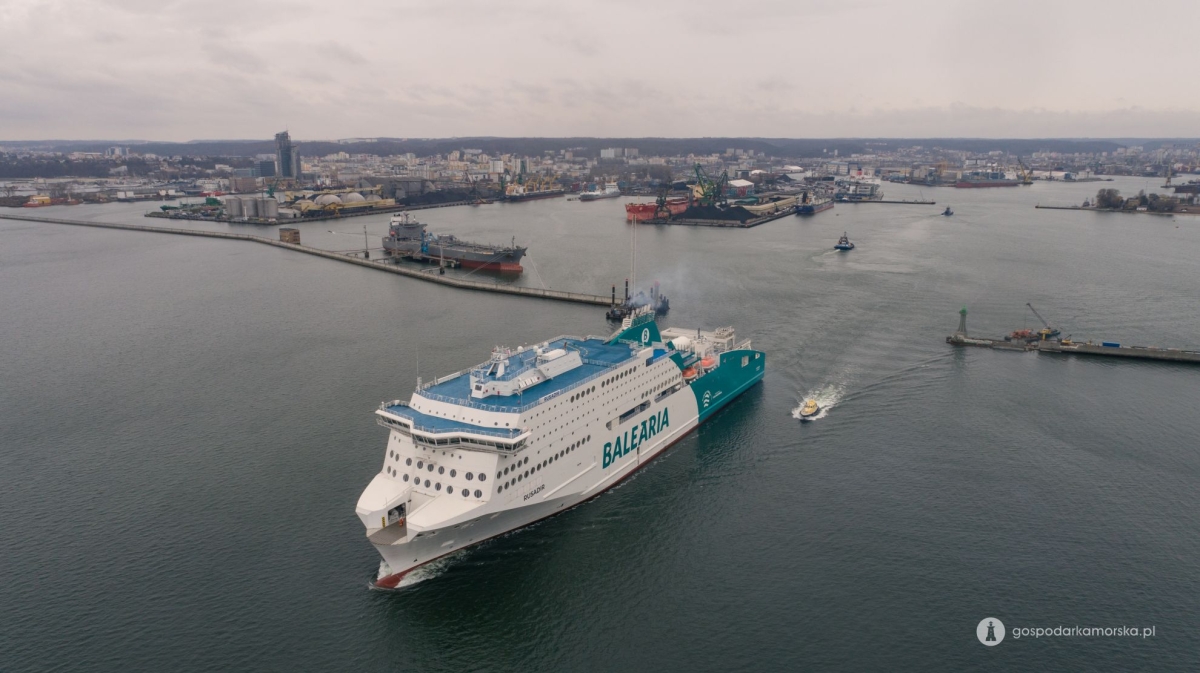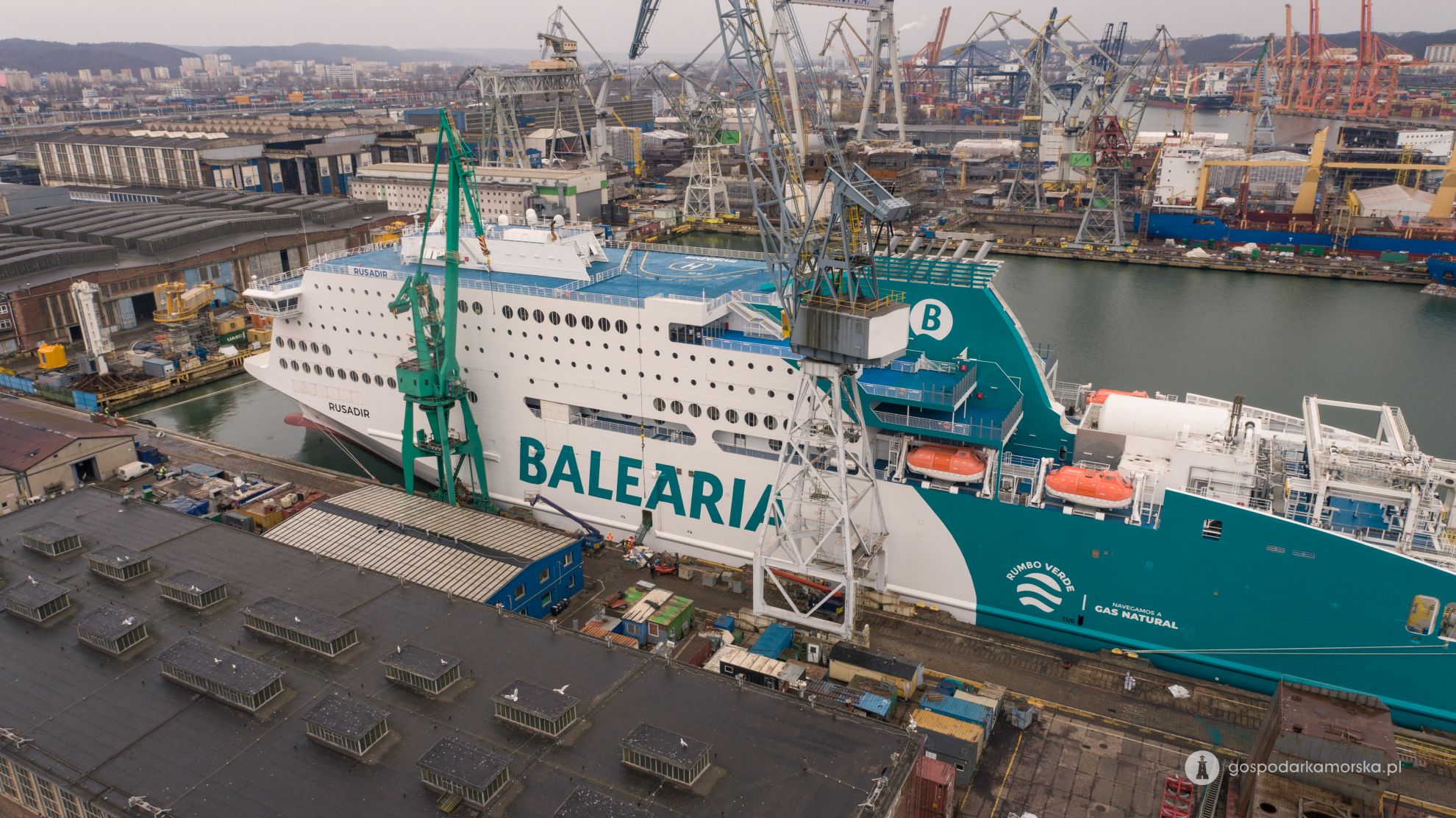
Rusadir - a modern ferry, which was undergoing the
last works in Gdynia before entering into operation in the colors of
the new operator, the Balearia lines, sailed from the Nauta Remontowa
Shipyard.
Rusadir came to Gdynia from Norway in May last
year and gathered great interest in the industry media. It was
rumored that the vessel, then still called Honfleur, was purchased by
one of the Polish carriers, which turned out to be untrue - the ferry
was chartered by the Spanish Balearia and will serve the route
between Malaga and Melilla. The vessel spent in Gdynia nearly ten
months. At that time, the shipyard workers from Nauta carried out
some of the last works on the ferry. We had the opportunity to look
aboard Rusadir just before she left Gdynia on March 23.
The ferry, although it is just entering into operation, already has a bit of history behind it. The ship was built in the docks of the German shipyard Flensburger Schiffbau-Gesellschaft for Brittany Ferries. The plan for it was to hit the line between the UK and France later in 2019. However, the shipyard began to struggle with financial issues, which caused numerous delays in production, which in turn led to the withdrawal of the shipowner. In 2020, the shipyard collapsed and the ferry was towed to the Norwegian shipyard Fosen Yard, where it was completed and underwent sea tests, and then went to Gdynia.
–
This is one of the most modern ro-pax passenger vessels, working on
dual-fuel with electric proupulsion for up to 1,800 passengers - said
its captain, Mariusz Bereźnicki, about the ferry. Although the ship
is only now entering into operation, Bereźnicki has been
accompanying it for a long time. – I have spent with the vessel
almost a year and a half, so since its stay in Norway, where we have
done major works to complete the vessel. I was with the vessel the
whole time. To be honest, now is the moment we've all been waiting
for - to finally see the passengers on board of our ship – said
Capt. Bereznicki.
Rusadir is a modern ferry with hybrid engines that can use both conventional marine fuel and liquefied natural gas (LNG). The ship can take 1,670 passengers and 130 crew members. The vessel has been designed to be energy efficient, with the shape of the hull and stabilizers for active roll suppression to help in this. The two car decks are accessible through both the wide bow and stern. There are two main engines in two engine rooms. Their shafts are electrically driven. Maneuvering is supported by two bow thrusters and one stern thruster. The ship can reach a speed of up to 22 knots at full power and a draft of 6.35 m. Passengers who will travel on the Rusadir will be able to choose between standard cabins and deluxe cabins, but it will be possible to go on a cruise without having to buy a cabin, using public areas on board. The ferry has numerous facilities and relaxation areas for travelers, such as a cinema or a disco.
The company managing the Rusadir ferry is SIEM Ship Management Poland based in Gdynia. She was responsible for contracting the crews. The core of the officer cadre - headed by the captain - are Poles. SIEM Ship Management Poland was also responsible for carrying out appropriate modification works to adapt the ship to the needs of the new operator - the Balearia lines.

SIEM Ship Management Poland is part
of a large company from the Maritime industry - SIEM Industries,
whose portfolio also includes, among others, SIEM Shipping, SIEM Car
Carriers, Subsea7, SIEM Offshore or Seaway7. The company's
headquarters is located in London, but the company also has its
office in Poland, in Gdynia.
The fleet of SIEM Ship Management
Poland includes, among others: the world's most modern LNG (Liquid
Natural Gas) car carriers such as SIEM Aristotle and SIEM Confucius,
which were the first ships of this type with this type of engines to
cross the Atlantic. SSM Gdynia is known on the shipping market for
its excellent fleet management, placing great emphasis on the safety
of its crews, passengers and cargo. The company from Gdynia was the
first company in the world to improve its "Drug & Alcohol
Policy" using the "k-NOX" device to monitor and
control its crews. The adopted on-line monitoring system enables
control in every corner of the globe, even in the middle of the
ocean, twenty-four hours a day.
SIEM Ship Management Poland is also
very much involved in protecting the marine environment. In addition
to the systematic introduction and verification of ISO 14001 and
50001 standard procedures, the SIEM company is dynamically operating,
among others, in American and European organizations supporting
environmental protection, such as NAMEPA, BSR Clean Cargo, Clean
Shipping Index, and the culmination of her efforts is obtaining the
prestigious USCG - Qualship 21 - E-Zero certificate.
–
It was a common effort of all parties. First of all SIEM Ship
Management based in Gdynia, Nauta Shipyard, Port of Gdynia and our
agency – Morska Agencja Gdynia. SIEM Industry is based in London,
but the most important work was done by people here, at SSM Poland
from Gdynia – said Capt. Bereznicki.
Rusadir spent the last months at
the Nauta shipyard before sailing to the Mediterranean Sea.
–
The most important work that was done here, at the Nauta shipyard
berth, was painting the hull in the colors of the new operator. The
funnel hull was painted with the big logo of Balearia on the side.
Also some minor works were done in outfitting the hotel department –
reported Capt. Mariusz Bereźnicki.
Literally a moment before leaving
the Nauta shipyard in Gdynia and sailing to the south of Europe, with
a short stop in Gdańsk, the captain did not hide his excitement.
–
Finally vessel is almost ready for sea service, we even have a hotel
crew on board, we are almost ready, so in a few days in Malaga we
will take on board the first passengers – he said.
Finally, around 12:00 on March 23,
the moorings were cast and Rusadir set off. Two tugboats assisted her
in maneuvering through the harbor channels. Representatives of Nauta
Shiprepair Yard and SIEM Ship Management observed the operation from
the shore. Other onlookers admired the exit of the 187-meter ship
from Ostroga Pilotowa. When the ferry passed through the heads of the
port, Captain Mariusz Bereźnicki connected with the Gdynia Harbor
Master's Office to thank them for over nine months of hospitality.
–
I had my family here, even my dog was living on board. I feel at home
here – said Capt. Bereźnicki, leaving Gdynia.


